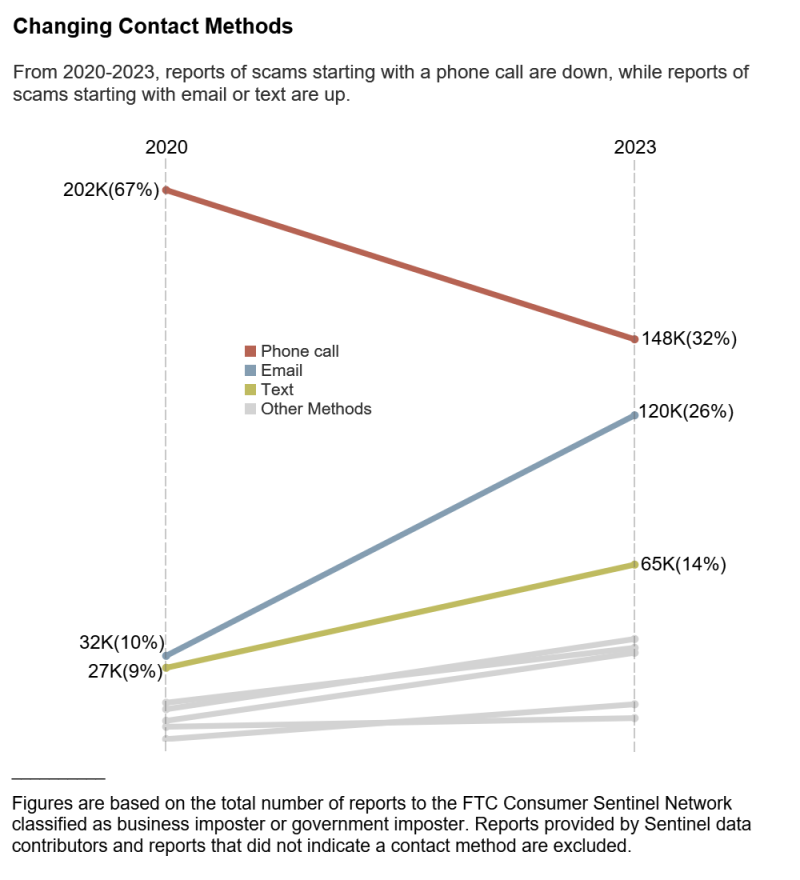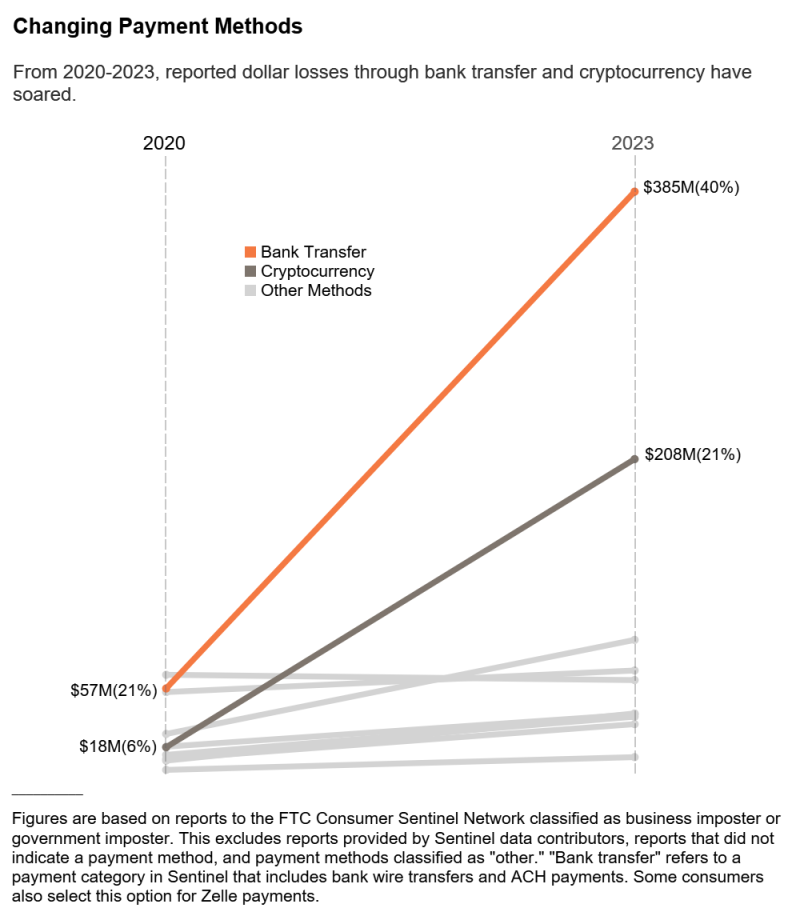Gift cards – the gift that keeps on taking. Impersonation scams cost Americans $1.1 billion in 2023

Americans lost over a billion dollars to scammers impersonating businesses or government agencies last year, the FTC says in a new report.
2023 saw Americans report 490,000 impersonation scams to the FTC, a figure the agency says represents nearly half the frauds reported directly to the FTC.
“Combined, reported losses to these impersonation scams topped $1.1 billion for the year, more than three times what consumers reported in 2020, more than three times what consumers reported in 2020,” the commission says in a report published this week.
Looking at the same three-year time span, FTC analysts noticed that reports of scams starting with a phone call have plummeted, while reports of scams starting with a text or email have increased.

Credit: FTC
In that same period, reports of losses through bank transfer and cryptocurrency skyrocketed, the agency says, adding the line between business and government impersonation scams is blurring.

Credit: FTC
“Many scammers impersonate more than one organization in a single scam – for example, a fake Amazon employee might transfer you to a fake bank or even a fake FBI or FTC employee for fake help,” according to the report.
While scams vary greatly, most reports involved one of these five swindles:
1. Copycat account security alerts
Supposed suspicious activity or unauthorized charges.
2. Phony subscription renewals
An account you never opened is about to auto-renew to the tune of hundreds of dollars.
3. Fake giveaways, discounts, or money to claim
A message about a giveaway, discount, or free money – e.g. discounts from your internet provider, a giveaway from a big retailer, or sweepstakes winnings from Publishers Clearing House.
4. Bogus problems with the law
Scammers posing as government agents say your identity has been used to commit a serious crime, such as money laundering or drug smuggling.
5. Made-up package delivery problems
Messages pretending to be from the U.S. Postal Service, UPS, or FedEx say there’s a problem with a delivery.
The report describes each scam in detail, giving Americans clues as to when they should become suspicious and hang up the phone or stop and think before acting. To that end, the FTC warns:
· Never click on links or respond to unexpected messages
· Don’t believe anyone who says you need to buy gift cards, use a Bitcoin ATM, or move money to protect it or fix a problem
· Slow down. Scammers want to rush you, so, again: stop and check it out
Bitdefender recently introduced Scamio, a free scam detector and prevention service for anyone with a Bitdefender account.
Got a phishing email, suspicious message or fake ad? Simply describe your situation to our clever chatbot and let it guide you to safety. You can also share with Scamio the exact thing you want to check, such as a screenshot, PDF, QR code, or link. Scamio lets you know in seconds if it’s an imposter, a sham, or fraud.
And don’t forget the powerful Scam Alert feature in Bitdefender Mobile Security. Scam Alert for iOS includes two layers of protection that monitor scams delivered through SMS/MMS messages and calendar invites. On Android, it goes even further, detecting link-based mobile attacks delivered through SMS, popular messaging apps (Discord, Telegram, Facebook Messenger, WhatsApp), and notifications.
The FTC’s new rule on government and business impersonation, finalized last month, is now in effect. It allows the agency to combat and deter scammers who impersonate government agencies and businesses, enabling the commission to file federal court cases seeking to get money back to injured consumers and civil penalties against rule violators.
tags
Author
Filip has 15 years of experience in technology journalism. In recent years, he has turned his focus to cybersecurity in his role as Information Security Analyst at Bitdefender.
View all postsRight now Top posts
How to Protect Your WhatsApp from Hackers and Scammers – 8 Key Settings and Best Practices
April 03, 2025
Outpacing Cyberthreats: Bitdefender Together with Scuderia Ferrari HP in 2025
March 12, 2025
Streamjacking Scams On YouTube Leverage CS2 Pro Player Championships to Defraud Gamers
February 20, 2025
How to Identify and Protect Yourself from Gaming Laptop Scams
February 11, 2025
FOLLOW US ON SOCIAL MEDIA
You might also like
Bookmarks








